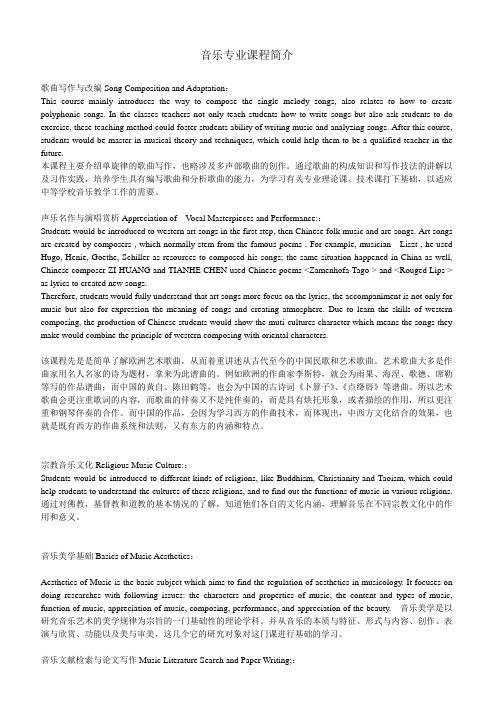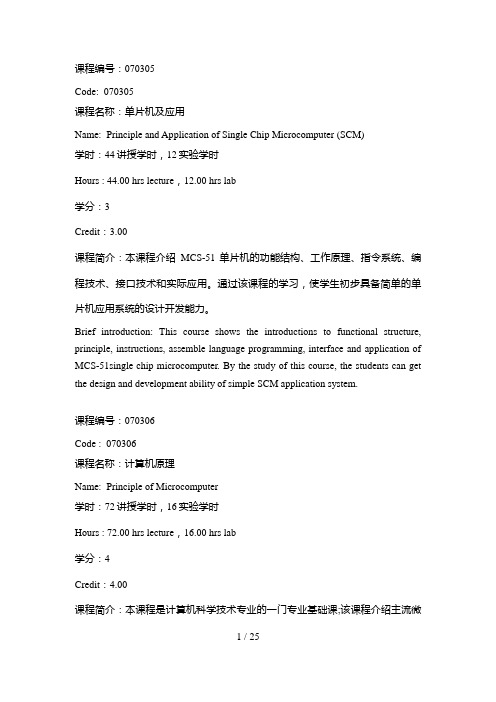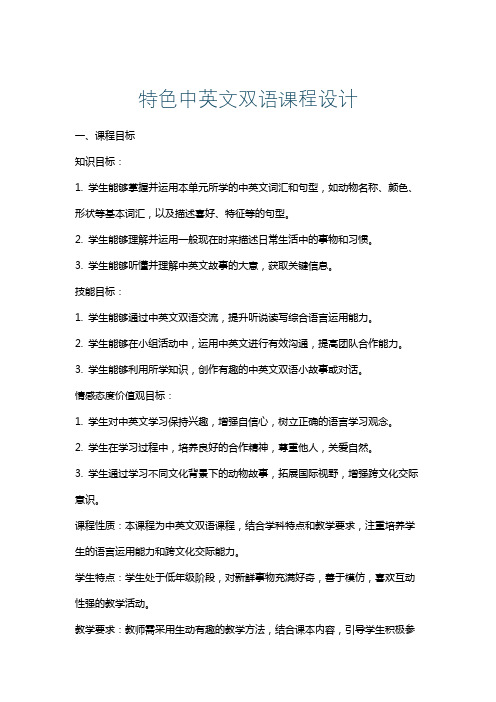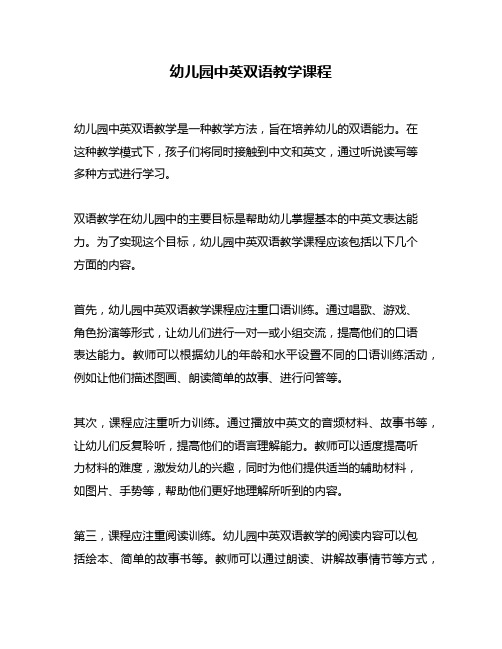课程描述中英双语
aca-商业计划(双语)课程描述

aca-商业计划(双语)课程描述英文版ACA-Business Planning (Bilingual) Course DescriptionThe ACA-Business Planning (Bilingual) course is designed to equip students with the necessary skills and knowledge to develop and implement effective business plans in both English and Chinese. This course combines theory with practical applications, providing students with a comprehensive understanding of business planning in a global context.Course Objectives:To introduce students to the fundamental principles and concepts of business planning.To develop students' ability to analyze and assess business opportunities in English and Chinese.To equip students with the skills to create comprehensive and strategic business plans in both languages.To enhance students' understanding of cross-cultural business practices and communication.Course Content:Introduction to Business Planning: Overview of the business planning process, its importance, and the role of strategic planning.Market Analysis: Techniques for analyzing market trends, competition, and target audiences in English and Chinese.Financial Planning: Understanding financial statements, budgeting, and financial projections for businesses.Operational Planning: Designing efficient operations, supply chain management, and logistics in both languages.Cross-Cultural Communication: Strategies for effective communication in multicultural business environments.Case Studies and Practical Exercises: Analyzing real-world business plans and developing plans for hypothetical businesses.Course Delivery:The course will be delivered through a combination of lectures, workshops, group discussions, and practical exercises. Students will also be required to complete assignments and case studies that promote critical thinking and analytical skills.Assessment:Assessment will be based on a combination of continuous assignments, case study analysis, and a final project that requires students to develop their own business plan in both English and Chinese.中文翻译ACA-商业计划(双语)课程描述ACA-商业计划(双语)课程旨在让学生掌握用中英文制定和实施有效商业计划的必要技能和知识。
音乐专业课程描述 中英文版

音乐专业课程简介歌曲写作与改编Song Composition and Adaptation:This course mainly introduces the way to compose the single melody songs, also relates to how to create polyphonic songs. In the classes teachers not only teach students how to write songs but also ask students to do exercise, these teaching method could foster students ability of writing music and analyzing songs. After this course, students would be master in musical theory and techniques, which could help them to be a qualified teacher in the future.本课程主要介绍单旋律的歌曲写作,也略涉及多声部歌曲的创作。
通过歌曲的构成知识和写作技法的讲解以及习作实践,培养学生具有编写歌曲和分析歌曲的能力,为学习有关专业理论课、技术课打下基础,以适应中等学校音乐教学工作的需要。
声乐名作与演唱赏析Appreciation of V ocal Masterpieces and Performance::Students would be introduced to western art songs in the first step, then Chinese folk music and are songs. Art songs are created by composers , which normally stem from the famous poems . For example, musician---Liszt , he used Hugo, Henie, Goethe, Schiller as resources to composed his songs; the same situation happened in China as well, Chinese composer ZI HUANG and TIANHE CHEN used Chinese poems <Zamenhofa Tago > and <Rouged Lips > as lyrics to created new songs.Therefore, students would fully understand that art songs more focus on the lyrics, the accompaniment is not only for music but also for expression the meaning of songs and creating atmosphere. Due to learn the skills of western composing, the production of Chinese students would show the muti-cultures character which means the songs they make would combine the principle of western composing with oriental characters.该课程先是是简单了解欧洲艺术歌曲,从而着重讲述从古代至今的中国民歌和艺术歌曲。
中英文课程描述计算机自动化

课程编号:070305Code: 070305课程名称:单片机及应用Name: Principle and Application of Single Chip Microcomputer (SCM)学时:44讲授学时,12实验学时Hours : 44.00 hrs lecture,12.00 hrs lab学分:3Credit:3.00课程简介:本课程介绍MCS-51单片机的功能结构、工作原理、指令系统、编程技术、接口技术和实际应用。
通过该课程的学习,使学生初步具备简单的单片机应用系统的设计开发能力。
Brief introduction: This course shows the introductions to functional structure, principle, instructions, assemble language programming, interface and application of MCS-51single chip microcomputer. By the study of this course, the students can get the design and development ability of simple SCM application system.课程编号:070306Code : 070306课程名称:计算机原理Name: Principle of Microcomputer学时:72讲授学时,16实验学时Hours : 72.00 hrs lecture,16.00 hrs lab学分:4Credit:4.00课程简介:本课程是计算机科学技术专业的一门专业基础课;该课程介绍主流微机的结构、指令及汇编语言程序设计和常用的接口电路。
Brief introduction: Principle of Microcomputer is a basic course of Computer Science and Technology; The course introduces the structure of the mainstream computer, instructions and assembly language programming and common interface circuit.课程编号:070307Code : 070307课程名称:接口技术Name: Microcomputer Interface Technology学时:28讲授学时,12实验学时Hours : 28.00 hrs lecture,12.00 hrs lab学分:2Credit:2.00课程简介:本课程是计算机应用专业的必修课;该课程介绍微机的总线及接口技术。
中英文课程描述(计算机、自动化)

课程编号:070305Code: 070305课程名称:单片机及应用Name: Principle and Application of Single Chip Microcomputer (SCM)学时:44讲授学时,12实验学时Hours : 44.00 hrs lecture,12.00 hrs lab学分:3Credit:3.00课程简介:本课程介绍MCS-51单片机的功能结构、工作原理、指令系统、编程技术、接口技术和实际应用。
通过该课程的学习,使学生初步具备简单的单片机应用系统的设计开发能力。
Brief introduction: This course shows the introductions to functional structure, principle, instructions, assemble language programming, interface and application of MCS-51single chip microcomputer. By the study of this course, the students can get the design and development ability of simple SCM application system.课程编号:070306Code : 070306课程名称:计算机原理Name: Principle of Microcomputer学时:72讲授学时,16实验学时Hours : 72.00 hrs lecture,16.00 hrs lab学分:4Credit:4.00课程简介:本课程是计算机科学技术专业的一门专业基础课;该课程介绍主流微机的结构、指令及汇编语言程序设计和常用的接口电路。
Brief introduction: Principle of Microcomputer is a basic course of Computer Science and Technology; The course introduces the structure of the mainstream computer, instructions and assembly language programming and common interface circuit.课程编号:070307Code : 070307课程名称:接口技术Name: Microcomputer Interface Technology学时:28讲授学时,12实验学时Hours : 28.00 hrs lecture,12.00 hrs lab学分:2Credit:2.00课程简介:本课程是计算机应用专业的必修课;该课程介绍微机的总线及接口技术。
特色中英文双语课程设计

特色中英文双语课程设计一、课程目标知识目标:1. 学生能够掌握并运用本单元所学的中英文词汇和句型,如动物名称、颜色、形状等基本词汇,以及描述喜好、特征等的句型。
2. 学生能够理解并运用一般现在时来描述日常生活中的事物和习惯。
3. 学生能够听懂并理解中英文故事的大意,获取关键信息。
技能目标:1. 学生能够通过中英文双语交流,提升听说读写综合语言运用能力。
2. 学生能够在小组活动中,运用中英文进行有效沟通,提高团队合作能力。
3. 学生能够利用所学知识,创作有趣的中英文双语小故事或对话。
情感态度价值观目标:1. 学生对中英文学习保持兴趣,增强自信心,树立正确的语言学习观念。
2. 学生在学习过程中,培养良好的合作精神,尊重他人,关爱自然。
3. 学生通过学习不同文化背景下的动物故事,拓展国际视野,增强跨文化交际意识。
课程性质:本课程为中英文双语课程,结合学科特点和教学要求,注重培养学生的语言运用能力和跨文化交际能力。
学生特点:学生处于低年级阶段,对新鲜事物充满好奇,善于模仿,喜欢互动性强的教学活动。
教学要求:教师需采用生动有趣的教学方法,结合课本内容,引导学生积极参与,确保课程目标的实现。
同时,关注学生的个体差异,给予每个学生充分的关注和指导。
通过多元化的教学评估,确保学生达到预期学习成果。
二、教学内容本章节依据课程目标,选取以下教学内容:1. 中英文动物词汇学习:包括猫、狗、鸟、兔子等常见动物的名称,及相关颜色、形状描述词汇。
- 教材章节:第一章《可爱的动物》2. 一般现在时态的应用:通过介绍动物的习性,教授一般现在时态的用法。
- 教材章节:第二章《有趣的动作》3. 中英文描述喜好和特征:学习如何用中英文表达对动物的喜好和描述动物的特征。
- 教材章节:第三章《动物大比拼》4. 中英文双语故事阅读:选取与动物相关的故事,进行中英文对照阅读。
- 教材章节:第四章《动物故事汇》5. 小组讨论与展示:分组讨论,用中英文介绍自己喜欢的动物,展示学习成果。
幼儿园中英双语教学课程

幼儿园中英双语教学课程幼儿园中英双语教学是一种教学方法,旨在培养幼儿的双语能力。
在这种教学模式下,孩子们将同时接触到中文和英文,通过听说读写等多种方式进行学习。
双语教学在幼儿园中的主要目标是帮助幼儿掌握基本的中英文表达能力。
为了实现这个目标,幼儿园中英双语教学课程应该包括以下几个方面的内容。
首先,幼儿园中英双语教学课程应注重口语训练。
通过唱歌、游戏、角色扮演等形式,让幼儿们进行一对一或小组交流,提高他们的口语表达能力。
教师可以根据幼儿的年龄和水平设置不同的口语训练活动,例如让他们描述图画、朗读简单的故事、进行问答等。
其次,课程应注重听力训练。
通过播放中英文的音频材料、故事书等,让幼儿们反复聆听,提高他们的语言理解能力。
教师可以适度提高听力材料的难度,激发幼儿的兴趣,同时为他们提供适当的辅助材料,如图片、手势等,帮助他们更好地理解所听到的内容。
第三,课程应注重阅读训练。
幼儿园中英双语教学的阅读内容可以包括绘本、简单的故事书等。
教师可以通过朗读、讲解故事情节等方式,帮助幼儿理解故事的中文和英文内容。
同时,教师还可以进行一些与故事相关的活动,如绘画、手工制作等,以增加幼儿对故事的理解和记忆。
第四,课程应注重写作训练。
通过练习写字、填写练习册等方式,让幼儿们掌握基本的中英文书写技能。
教师可以引导幼儿根据所学的知识,进行简单的写作练习,如写一封信、写一篇小作文等。
此外,幼儿园中英双语教学课程还应包括一些游戏和活动,以增加幼儿学习的趣味性和灵活性。
例如,教师可以组织一些游戏,如对话游戏、词语接龙等,让幼儿通过游戏的方式巩固所学的中英文知识。
同时,教师还可以开展一些有趣的活动,如拼图比赛、角色扮演等,激发幼儿的学习兴趣和创造力。
总之,幼儿园中英双语教学课程应注重口语、听力、阅读和写作的综合训练,通过多种形式的教学活动,帮助幼儿掌握基本的中英文表达能力。
这不仅可以为幼儿日后的学习奠定良好的基础,同时也可以培养他们的跨文化交流能力,为他们的未来发展打下坚实的基础。
介绍课程5句话英语作文
介绍课程5句话英语作文英文回答:The course is designed to provide students with a comprehensive understanding of the field of [field name]. It covers the fundamental concepts, theories, and methodologies of the discipline, and explores the latest research and developments in the field. The course is divided into several modules, each of which focuses on a specific aspect of the subject matter. Students will engage in a variety of learning activities, including lectures, discussions, readings, and assignments, to develop their knowledge and skills in the area. The course is taught by experienced and knowledgeable instructors who are passionate about sharing their expertise with students. Upon completion of the course, students will have a solid foundation in the field and be well-prepared for further study or a career in the field.中文回答:本课程旨在为学生提供对[领域名称]领域的全面理解。
英语专业中英文课程描述
英语专业课程描述Course Description for the Specialty of English1、基本信息姓名:学号:学院:专业I. Basic informationName:Students No.:College: Department of foreign languagesSpecialty: English (Orientation to international trade)2、教学安排修业年限:4年(2009.9——2013.7)拟授学位:文学学士教学计划:公共基础课15.5学分,专业课23 学分,实践必修课8.5学分,选修课2.5学分共49.5学分II. Teaching arrangementsDuration of studying: Four years (From September 2009 to July 2013)Academic degree to be conferred: Bac helor’s degree of artsTeaching plan: The required credits have totaled 49.5, in which 15.5 credits are for public elementary courses; 23 credits for specialized courses; 8.5 credits for practical obligatory courses; 2.5 credits for optional courses.3、2009.9-2010.7已修课程描述III. Description of the courses which have been completed from September 2009 to July 20101、基础英语Fundamental English(6学分)本课程是面向英语专业学生的必修课。
大学英语课程中英文简介
《大学英语》课程中英文简介College English课程代码:130014A/130044A Course Code:130014A/130044A课程名称:大学英语Course Name:College English学时:64 Periods:64学分:4 Credits:4考核方式:考试Assessment:Examination先修课程:无Preparatory Courses:None大学英语课程是一门基础课程,内容包括听、说、读、写、译五个部分。
本课程是以外语教学理论为指导,以英语语言知识与应用技能、跨文化交际和学习策略为主要内容,并集多种教学模式和教学手段为一体的教学体系。
大学英语的教学目标是培养学生的英语综合应用能力,特别是听说能力,使他们在今后学习、工作和社会交往中能用英语有效地进行交际,同时增强其自主学习能力,提高综合文化素养,以适应我国社会发展和国际交流的需要。
大学阶段的具体英语教学要求分为三个层次,即一般要求、较高要求和更高要求。
一般要求是我校非英语专业本科毕业生应达到的基本要求。
较高要求或更高要求是为快班和实验班学生根据自己的能力、自己所在院系的类型和人才培养目标所选择的标准而推荐的。
大学英语课程分为综合课和视听说两种课型。
综合课使用大学英语综合教程,听说课使用新视野大学英语视听说课本。
每周两节综合课,两节视听说课程。
在两年的学习中,普通班学生应完成四级的学习并通过大学英语四级考试;快班和实验班学生应完成大学英语六级内容并通过大学英语六级考试。
COLLEGE ENGLISH is divided into INTEGRATED COURSE and VIEWING, LISTENING & SPEAKING, with four periods of class each week. It includes listening, speaking, reading, writing and translation. Within two years of college English study, students should be able to pass CET 4 and students in Advanced Class should pass CET 6.《高级阅读Ⅰ》课程中英文简介Advanced Reading Ⅰ课程代码:130092A Course Code:130092A课程名称:高级阅读ⅠCourse Name:Advanced ReadingⅠ学时:32 Periods:32学分:2 Credits:2考核方式:考试Assessment:Examination先修课程:英语阅读Preparatory Courses:English Reading《高级阅读Ⅰ》在进一步介绍阅读技巧和方法的基础上,重点分析这些技巧和方法如何应用到实际的阅读中,如何分析不同题材的特点,如何针对不同阅读目的运用不同的阅读方法,提高阅读的质量和数量,提高阅读理解能力。
幼儿园中英双语教育课程
幼儿园中英双语教育课程幼儿园中英双语教育课程是指在幼儿园阶段,为了给幼儿提供一个在中英两种语言环境下学习的机会,设计的一种教育课程。
这种教育课程旨在培养幼儿的语言能力、学习能力、思维能力和文化意识,并为幼儿奠定一个良好的学习基础。
幼儿园中英双语教育课程的内容可以分为语言类、学科类和综合类三个主要部分。
语言类课程是幼儿园中英双语教育课程的基础,旨在通过大量的英语语言输入和互动活动,使幼儿在愉快的学习氛围中感受英语的乐趣。
这类课程的内容包括英语歌曲、儿歌、英语故事、英语绘本和英语角等。
这些活动可以通过音乐、游戏、角色扮演等形式开展,帮助幼儿建立起对英语的兴趣和自信,并逐步提高他们的英语听、说、读、写的能力。
学科类课程是幼儿园中英双语教育课程的核心部分,旨在通过英语教育,帮助幼儿掌握各种学科的基本知识和技能。
这类课程的内容包括数学、科学、艺术、音乐、体育等。
幼儿可以通过英语的方式学习这些学科知识,提高自己的学科能力。
例如,在数学课上,幼儿可以通过英语歌曲和游戏学习数字、形状和计数等概念。
在科学课上,幼儿可以通过实践探索的方式学习国度、动物和植物等科学知识。
综合类课程是幼儿园中英双语教育课程的拓展部分,旨在通过跨学科的学习,培养幼儿的综合能力和创造力。
这类课程的内容包括社会科学、地理、历史、计算机等。
幼儿可以通过英语的方式学习这些课程,了解不同的文化、地理和历史,培养对社会和世界的认识和理解。
例如,在社会科学课上,幼儿可以通过游戏和访问学习家庭、社区和不同职业的知识。
除了以上的基础、核心和拓展的课程内容,幼儿园中英双语教育课程还包括其他一些辅助活动和项目。
例如,幼儿可以参加英语角的演讲比赛,通过讲英语的方式表达自己的想法和观点。
幼儿还可以参加各种英语游戏和英语竞赛,锻炼自己的英语能力。
此外,幼儿还可以参加英语话剧和英语角色扮演等活动,通过表演的方式提高自己的英语口语和表达能力。
幼儿园中英双语教育课程的优势在于它能够为幼儿提供一个双语学习环境,让幼儿在早期就接触并习得英语。
- 1、下载文档前请自行甄别文档内容的完整性,平台不提供额外的编辑、内容补充、找答案等附加服务。
- 2、"仅部分预览"的文档,不可在线预览部分如存在完整性等问题,可反馈申请退款(可完整预览的文档不适用该条件!)。
- 3、如文档侵犯您的权益,请联系客服反馈,我们会尽快为您处理(人工客服工作时间:9:00-18:30)。
Courses Description1.Specialized English of Process Equipment and Control EngineeringThe book's main texts and reading materials are selected from various well-known Western science and technology publishing original English books, and taking into account a variety of different genres and the Anglo-American style. The book includes basic process equipment mechanics six parts, metal materials, process industry, process equipment, process equipment and process control equipment, a total of 30 units. Each unit consists of the main text, main text vocabulary, text annotation, job training, reading material and reading material composed of vocabulary, the book with a total vocabulary list.2.Advanced MathematicsThe study of different and integral calculus. The topics include functions, limits, differentiation of polynomial, trigonometric, exponential and logarithmic functions, product, quotient and chain rules, applications of differentiation, derivatives and definite integrals, integration by substitution; A continuation of the study of calculus with topics including: Riemann sums, techniques of integration, elementary differential equations and applications, parametric equations and polar coordinates, sequences and series, Taylor series.3.Linear AlgebraBases on the discipline of logical thinking and the principles of solid foundations, this course emphasizes on basic concepts, theories and approaches of Linear Algebra, and fosters students’ operational capabilities and practica l problems-solving skills in professional fields.4.Probability and StatisticsThis course emphasizes on basic concepts, theories and approaches of Probability and Statistics. Based on the discipline of logical thinking and the principle of solid foundations, it fosters students’ operational capabilities and practicalproblems-solving skills in professional fields.5.Fundamentals of ComputerThe course is encouraged to learn for students of Measurement and Control Technology and Instrument Program. The main purpose of this course is to enable the students to know the working principles of computers’ hardware and software, and relative knowledge.The theory teaching of the course mainly has three parts. The first part is basis of computer: to know the composition of computer hardware and software, to know data expression and operation in computer; the second part is basic computer operation skill, which mainly include master the usage of Windows operation system, Word, Excel and Power Point; the last part is to know basic knowledge of network:transmission media, connecting device, transfer protocols, internet and its applications.6. C Language and ProgrammingThe course is computer public courses for engineering students who are studying computer science; main objective is to study the program structure and programming technology. It mainly involves: algorithm, the basic data types, simple program, select structure, loop structure, array, function, pointer, structure, etc.7.University PhysicsThe course involves basic theory like mechanics, electromagnetism, vibration and wave, wave optics, special relativity and quantum physics foundation.8.Mechanical Design BasisThis course is an important engineering machinery professional technology foundation course. The courses are to enable students to start from understanding the whole picture machine, the machine's functional components analysis, kinematics and common components, structure and design. Through this course can improve students' comprehensive ability of mechanical design, innovation and the ability to solve practical engineering problems.9.Engineering ThermodynamicsThe main task of this course is to enable students to master the basic laws of thermodynamics and the basic theory, familiar with the basic principles of the basic properties of the working fluid and the actual thermal means, learn to abstract and simplify practical engineering problems, use the energy equation, entropy equation as based analytical methods, and laid the foundation for the further development and application of energy-saving technologies.10.Metal TechnologyThis course is a comprehensive technical basis for the process of manufacturing metal parts, which mainly focus on the regularity of various technological processes and their application in mechanical manufacturing, and the process and structure of the metal parts in machinery manufacture, the performance metallic materials commonly used and the impact on processing technology, comprehensive comparison of the process approach.11.Engineering Fluid MechanicsFluid dynamics is a discipline that studies the force of fluid and its macroscopic motion. It is a long time since people in the process of using fluid, which is not only the nature of the basic discipline, but also the characteristics of the application subject. Engineering fluid mechanics, which focuses on the application, is an important technical basis.12.Process Principle and EquipmentThis course is of importance for the Process Equipment and Control Engineering major. It builds a bridge between the basic course and specialized course. Its research content is the physical operation process and equipment in chemical production process. Research methods are mainly theoretical analysis and experimental study under the guidance of the theory. The main task of this course is to train students to study, analyze and deal with the practical problems in the practice of dialectical materialism, analyze and deal with the practical problems. This course is based on two basic courses of Advanced Mathematics and General Physics.13.Physical ExperimentPhysical experiment is an independent compulsory basic course for students of higher learning institutions. It is the beginning of the students learning college experimental methods and skills training. It is the important foundation of the training and improvement of scientific experiment quality. Physics is an experimental science. Physics experiment teaching and physical theory teaching has the same important position. They have deep inner connection and cooperation, and they have their own task and function.(1)By observing the phenomenon of physics experiments, analysis and physicalmeasurements, learning physics experiment ideas, principles and methods, todeepen the understanding of the physical experimental design innovative thinking.(2)Cultivate and improve the basic quality of students' scientific experiments,including:A.through reading textbooks or materials (including onlineresources), basic mastering experimental principles and methods getting ready for the experiment.B.through experimental materials and equipment specifications,under the guidance ofthe teacher, the proper use of commonequipment and auxiliary equipment, complete the hierarchy ofcontent, in particular understanding of experimental design and method.C.couldcarry the principles, ideas, methods and theories ofphysics knowledge and prel iminary analysis of experimentalphenomena, and gradually learnto ask questions, analyze and solve problems.D.to correctly record and processing of experimental data, drawa curve, analysisresults, written qualified test reports.E.can be completed in accordance with specifications require thatthe design of the experiment.F.under the guidance of the teacher, to consult the concerned scientific andtechnical literature, experimental principles and methods,which can conduct basic experiments with researchor creative content, and write the thesis of the research experiment.14.Descriptive Geometry and Mechanical DrawingDescriptive geometry is a basic and instrumental course. This course is a branch of geometry, and it is a study of the geometry and location of a two-dimensional graphic representation of three-dimensional space. Mechanical drawing provides overall knowledge of basic theory of projection and enables students to develop the ability to draw and read the mechanical drawing ,including the space thinking ability, which is of importance for innovative thinking and design,.15.Interchange and Measurement TechniqueThis book systematically discusses the basic knowledge of "exchange and technology measurement", analyzes the new standard of the tolerance and cooperation in our country, expounds the basic principle of the technique, and reflects some new testing techniques. The main contents include introduction, hole and shaft limits and fits, length measurement based, shape and position tolerance and detection, surface rough degree and detection, smooth limit gauge, rolling bearing of tolerance and fit, dimension chain, cone tolerance and detection, thread tolerance and detection, health and spline tolerance and fit, involute cylindrical gear accuracy and detection.16.Engineering MechanicsThe course consists of two parts--mechanics of materials and theoretical mechanics. Mechanics of materials enables managers to improve their understanding of the mechanical properties of the material, including the strength, stiffness and stability of the components. Theoretical Mechanics consists of two volumes. V olume I covers the content of statics, kinematics, kinetics. It is basic foundation for most specialties with moderate period of theoretical mechanics. V olume II comprises the elements of analytical mechanics, the particle dynamics in non-inertial reference frame, collision, elements of mechanical vibration, motion of rigid body with a fixed point, general motion of a rigid body, resultant motion of a rigid body, approximate theory of gyroscope, dynamics of a body with variable mass.17.Engineering Materials ScienceEngineering materials science is the application of materials science, which mainly discusses the mechanical properties of structural materials and expounds the influence of the structure, composition and properties of structural materials to solve the engineering application problem.18.Electrical and Electronic TechnologyElectrical engineering is a basic course which aims to study the theory and application of electrical and electronic technology. Electrical and electronic technology is developing very rapidly, the application is very extensive, all new modern science and technology are all closely related to electric. Therefore, electrical engineering is of importance in engineering foundation courses, which has a basic, practical and advanced technology.19.Curriculum Design of Mechanical Design BasisThe task is to design a driving device for belt conveyor. To develop the abilities of analyzing and solving practical problem using the theory learned in machine design and other theory course.(1)According to the task’s requirement, analysis the architecture of the belt conveyor,main components’parameters, material and manufacturing checking method, technical specifications.(2)The Selection and Calculation of Parameters in Every Measuring StepDesign and calculation of main parts-gears, bearings, shafts and other.(3)Drawing The Design DraftAccording to the calculation of the mechanisms’and components’scale, draw a design draft, assure the instrumentation’s outline and shape.(4)Students’ Design Work RequiredA.design an assembling drawing;(2# drawing sheet)B.parts drawings for output shaft and driven gear;C.one design specification20.Process Fluid Machinery(studying)The book takes piston, centrifugal compressors and pumps as the main object which are typical and widely use in fluid machinery, expounds how they work, what structures are, what operating characteristics and adjustment method are and the safety and reliability of the machine, etc. and pay attention to contact some chemical plants and oil refining, characteristics and development trends of oil chemical plant.21.Process Equipment Manufacturing and Maintenance(studying)Process equipment mainly refers to the key equipment that typical chemical, petroleum, pharmaceutical, light industry, energy, environmental protection and food industry production process involved. From the perspective of process equipment manufacturing process, equipment described above may be divided into two categories: one is welding equipment used as the main means to manufacture part of the process; the other is mechanical processing used as the main means of process manufacturing machine parts.22.Process Equipment Control Technology(studying)The book highlights the characteristics of professional process equipment and control engineering, both strive to master the basics of control theory related, and based on practice and application, while emphasizing its advanced nature. From the application point of departure automatically controlled process equipment, introduces the basic concepts of the process control system, the composition of the process control system, the principle and its application; common parameters measurement of pressure, temperature, flow, level, material composition, etc., and instruments used, structure, principles and applications of the instrument; and finally a brief introduction of several currently more advanced process control system.23.Process Equipment Design(studying)This course is one of the main courses of process equipment and control engineering,. Through the study of this course, students can be integrated using basic theory and related engineering practice knowledge from basic courses and professional basic courses. Also basically have engaged in process equipment design and research and development the initial capacity.24.Process Equipment Corrosion and ProtectionThrough this course, students can reasonably have learned about the use of corrosion protection and protection of knowledge to solve practical problems. Have clearer understanding in metal corrosion theory, basic concepts and important mechanism,. Can conduct a preliminary analysis of the general corrosion phenomena. Initial grasp of the main chemical machinery manufacturing metal materials and corrosion resistance, the main physical and mechanical properties and applications ofnon-metallic materials. In terms of preventing corrosion, requiring students to understand the basic principles, main applications and conditions.25.Process Equipment Testing TechnologyThis courses from process equipment test technology of actual application starting, main introduced basic knowledge, sensor of principle and the structure of process equipment test technology; described measurement method and structure, principle and application of instrument for common parameter like pressure, temperature, flow, liquid bit, and material components, etc; introduced detection method of dynamic and static equipment, briefly introduced the new progress of test technology.Teaching affairs office of college of(stamp)Liaoning Shihua University1st Dec.2015课程描述1.专业英语(过程装备与控制工程)这本书的主要文章和阅读材料是从各大知名西方的科学技术出版社原版英文书籍选择,并考虑到了各种不同的流派和英美风格。
